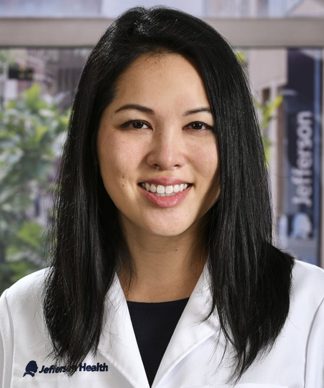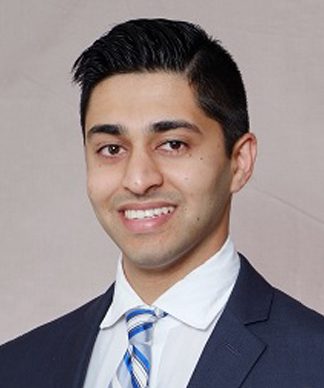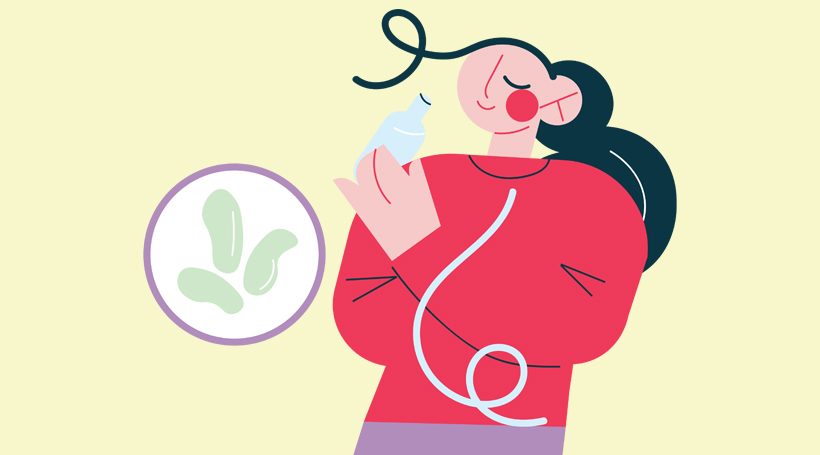If words like “gut microbiome” and “microbial properties” have recently become a comfortable part of your vocabulary, you aren’t alone. (And if they haven’t – they will be soon.)
“Gut health seems to be really popular in the mainstream media these days,” says Lucy Joo, DO, a gastroenterologist at Jefferson Health – New Jersey.

Lucy Joo, DO
Some of the most common symptoms that bring people into the GI doctor’s office are altered bowel habits, diarrhea, constipation, abdominal bloating, heartburn, reflux and bleeding where no one ever wants to bleed. They’re topics that, in the past, people would keep to themselves and privately suffer.
But lately, GI issues have become regular topics of conversations, in large part thanks to the prevalence of social media wellness influencers sharing their X, Y and Z tips for protecting your gut microbiome (not to mention what supplements they happen to be using at the time). And that’s both a good and a bad thing, Joo says.
“One of the good things about people discussing gut health in social media is that we’re de-stigmatizing it, so people are more open and willing to talk about it with each other – and their doctors,” she says. “On the flip side, it’s unregulated, so anyone can go out there and say, ‘Hey, I’m an expert in this field and here are the supplements you should take.’”
Which, she says, is one of the most dangerous things you can do.
“I’ve looked up a few of the supplements floating around social media,” says Joo, “and even I don’t understand what’s in them. Knowledge is the only way you can empower yourself and your own healthcare, so it’s good to do your own research online, but I don’t recommend taking any medications or supplements without checking with your doctor first.”
That’s not to say there aren’t doctor-approved ways to strengthen your gut health before even experiencing any symptoms.
“Your microbiome consists of a natural gut flora, and eating the right foods is important,” says Joo.
For example, everyone thinks they have a high-fiber diet, she says, but most miss the mark. She recommends getting 25 to 30 grams of fiber a day, which you’re very unlikely to hit unless you’re actively setting out to meet that goal.
“The best way to get all your fiber is through a natural diet, like bulking up on fresh fruits and vegetables,” says Joo. “Also, adding fermented pickled food for the probiotics can go a long way – things like kombucha or sauerkraut. I’m Korean, so my go-to is kimchi.”
And it’s not just about what you eat.
“There’s a lot of things that contribute to gut health,” says Joo. “Including your mental health.”
Just as important as eating well is making sure you get enough sleep and managing your stress and anxiety, “which is especially important right now with everything going on,” says Joo. “Your emotions can manifest in your gut, like when you feel butterflies in your stomach when you’re nervous, or you experience diarrhea or constipation when your anxiety is high.”
Many of the most common gut health issues, especially if they’re a one-off symptom, are easy to overlook, she says. While a quick Tums may clear it up, there are definite warning signs that you should see a doctor (and not a TikTok content creator).

Kunal Dalal, MD
“If there’s any chronicity to it, like persistent bloating, gas, acid reflux, nausea, abdominal pain, significant weight loss – it’s time to see a doctor,” says Kunal Dalal, MD, a gastroenterologist at Cooper University Health Care’s Digestive Health Institute. “It can happen sporadically for a week or 2 and then resolve itself, which is normal. But when it turns into 3 months, 6 months, when you can’t sleep at night because of the pain or there are significant alterations to your daily life, that’s when the alarm bells should go off.”
In the era of Covid, many people have been putting off doctor visits for fear of contracting the virus in the doctor’s office. But with gastro issues, delaying care is the last thing you should be doing, he says. Especially for anyone with a family history of colon or stomach cancer, because the barrier for warning signs lowers.
“It’s always important to speak with your doctor whenever something changes in your body because these symptoms can sometimes speak to pretty significant health concerns,” says Dalal. “It can be inflammatory bowel diseases like Crohn’s Disease or Ulcerative Colitis. It can be Celiac Disease or a gluten sensitivity, or even underlying infections like H. pylori, which is a bacteria that lives in your digestive tract.”
Sometimes it’s nothing out of the ordinary, and sometimes it’s cancer, he says. With a system as important as your digestive tract, it’s always best to know for sure.
“Diseases can present in a lot of different ways, so sometimes it can take months, or even years, to find the proper diagnosis,” says Dalal. “In the meantime, we try to keep patients off what we like to call Dr. Google to keep them from diagnosing themselves – and coming up with their own treatment plans.”
Among the more common Dr. Google treatment tips is to cut certain foods from your diet one at a time, over a specific period of time, to see if symptoms get better when you stop eating a certain food. In fact, says Dalal, doctors often use what’s called an “elimination diet” to find the core issue, the most common being wheat, milk, eggs, nuts, soy, fish and shellfish.
“But even though that may seem straightforward, there are so many nuances,” says Dalal. “It really depends on the pathology of what you’re treating, and it really should be done with doctor supervision and input. When you try to do it yourself, you could be wasting weeks, months or even years of valuable time without ever getting any real information.”
Because just like any other disease, early intervention is key.
“Preventative measures are the most important thing you can do,” he says. “Colonoscopies are huge, especially since the American Cancer Society recently lowered the age to start screening from 50 to 45. When you come early, we’re able to help detect issues like polyps, which we can catch and treat even before they turn to cancer.”
“My goal is to prevent these issues,” adds Dalal, “not to treat them.”














